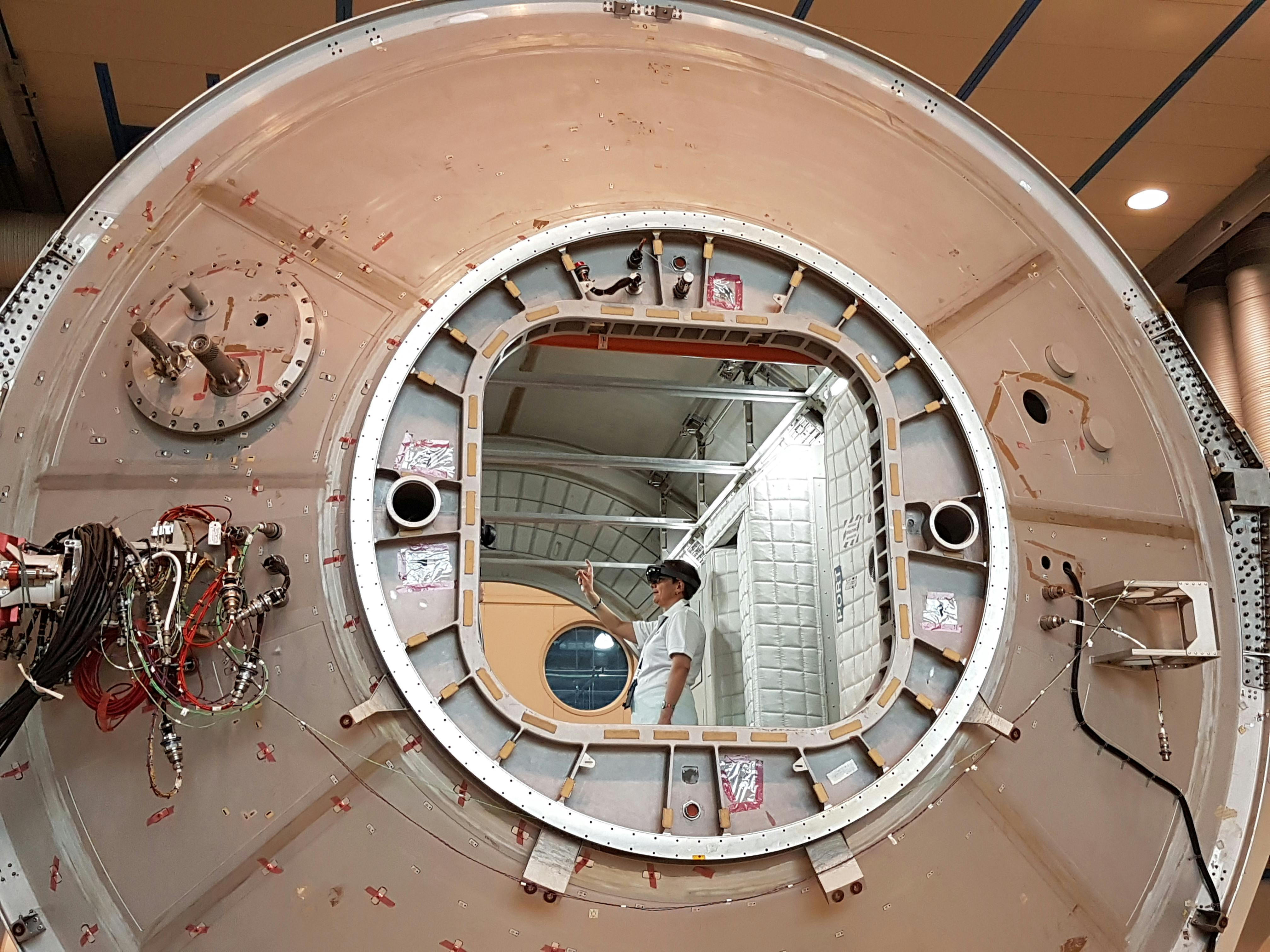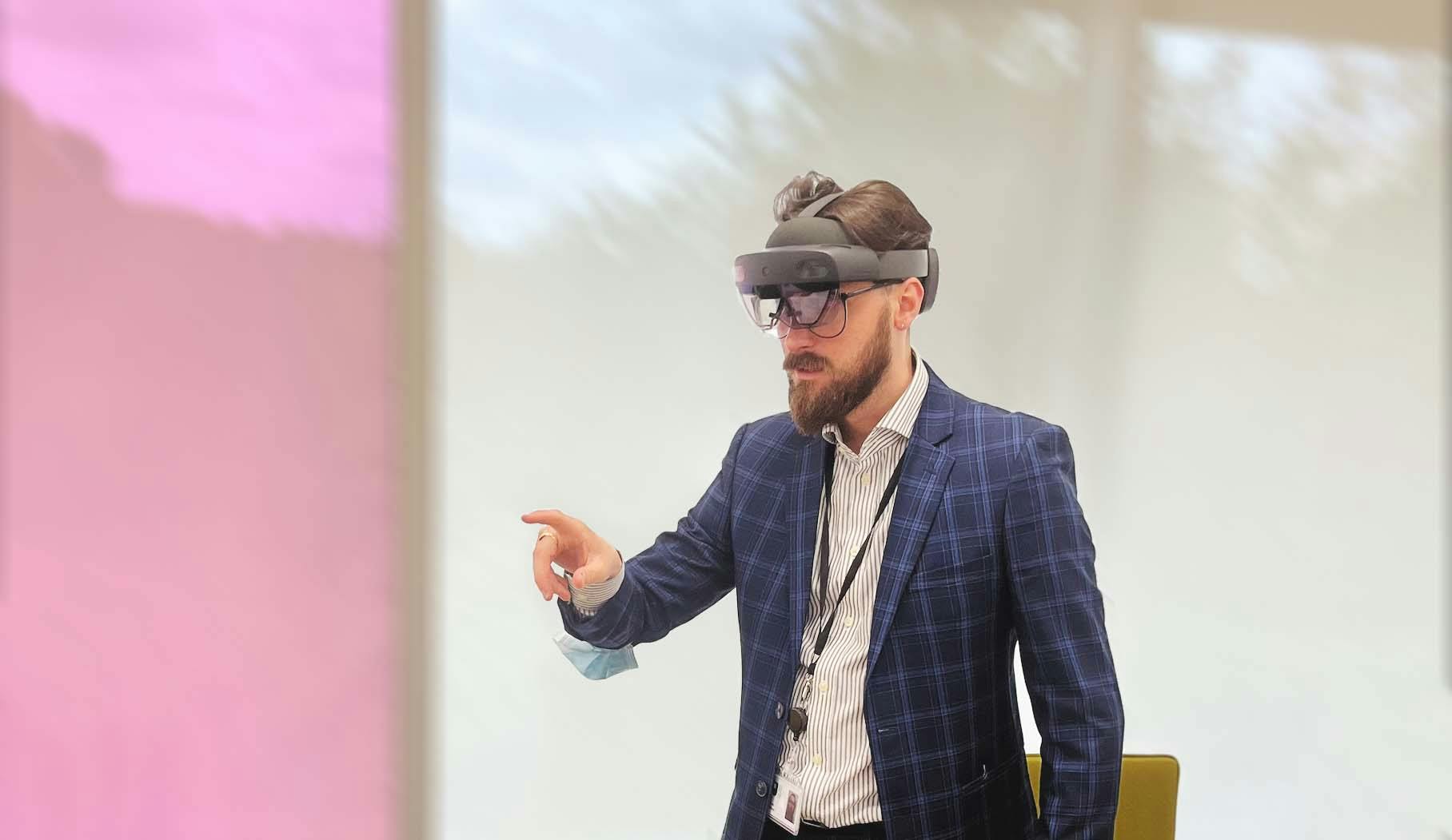
Editorial
Creating an interactive holographic artificial intelligence
Xinyu Huang explores 3D scanning, 3D reconstruction, motion capture, and natural language processing within her doctoral research at the OU's Institute of Educational Technology.

IET hosts the first face-to-face meeting of the Performance Augmentation Lab (PAL), with researchers presenting on their research projects, exploring mixed reality and technology-enhanced learning.
The Performance Augmentation Lab (PAL), led by Prof Fridolin Wild, Professor at the Institute of Educational Technology, The Open University, brings together members of the IET who collectively seek to bridge the dissociative gap between abstract knowledge and its practical application.
Members of the PAL share a collective drive to research radically new methods of using mixed reality technology with innovative educational approaches, connecting knowing something 'in principle' to applying that knowledge 'in practice'. This research is leading ways to speed up the refinement of experience and integration into polished performance.
In May 2022, the Performance Augmentation Lab met face to face for the first time, with presentations and workshops delivered by members on the status of their research. Members include: OU professors, academic researchers, PhD researchers and learning designers based in IET.
During the meeting, Prof Fridolin Wild shared an overview of the Performance Augmentation research programme, commenting on a body of research which has led to the foundation of the programme.
During this period, Fridolin remarked on how the Covid pandemic has accelerated existing trends in learning, teaching and training, referencing the future of work after COVID-19 report, published in 2021 by McKinsey management consultancy, which states that "remote work e-commerce, and automation, with up to 25 per cent more workers than previously estimated potentially needing to switch occupations".
Adding to this, Fridolin shared the ways that IET are responding to the relevant transformations within society, through the work of its researchers, educational technologists and curriculum professionals. These include ways that the OU's flagship cross-platform mixed reality application can support rapid reskilling with augmented reality, how the IET is leading globally to develop the new standard for Augmented Reality Learning, and how PhD students in Educational Technology are pushing the boundaries of research with innovative methodologies.
Just after the lab meeting, Fridolin shared further insight at the Integrated Systems Europe Digital Learning Summit 2022, discussing the ways that ground-breaking technologies can be used with pedagogical methodologies to upskill workers for jobs across a range of industries. See the following TV interview recorded at the event to hear Fridolin's comments.
Among the research presented at the Performance Augmentation Lab meeting, Xinyu Huang and Yuko Suzuki, two PhD students in Educational Technology at the OU, discussed their doctoral research, which uses using mixed reality technology to improve learning experiences.
Xinyu Huang, PhD candidate at the OU, is researching the use of various innovative technologies, such as 3D animation and motion caption technologies, towards the creation of a virtual performer in augmented reality, which she describes as "Holographic Artificial Intelligence". Read more about her research below.

Editorial
Creating an interactive holographic artificial intelligence
Xinyu Huang explores 3D scanning, 3D reconstruction, motion capture, and natural language processing within her doctoral research at the OU's Institute of Educational Technology.
Also, Yuko Suzuki, PhD candidate at the OU, is exploring avenues for mixed reality technology to improve engagement in different learning environments, with the aim of making science more understandable to audiences. Read more about Yuko's research below.

Editorial
Making science more comprehensible with mixed reality
Yuko Suzuki investigates ways that mixed reality dimensions within a learning context can make science more understandable, during her doctoral research at the OU's Institute of Educational Technology.
Alongside academic researchers, educational technologists are leading a number of research activities within IET's Performance Augmentation research programme.
Presenting at the meeting, Robert Hillman, Educational Technology Developer in Augmented Reality at the OU, shared his role in assisting in the development of the Mirage-XR application, an augmented reality (AR) training app designed to assist the rapid teaching of skills.
Discussing his role in the development of the app and its intended impact, Robert shared:
"The system allows a user to create AR activities which are broken down into action steps, containing augmentations. My role has been to help develop the different types of augmentations [augmented reality content] for the Mirage app, that allow a user to create training activities for their context."
"I have always had an interest in emerging technologies and their use cases so it is not difficult to stay motivated working on this project. I believe that AR will make valuable training more accessible for countless professions to people all over the world and luckily I am able to work with this incredible tech everyday."

Also presenting, Felipe Tessarolo, Learning and Teaching Enhancement Manager in IET, discussed OpenReal, a project seeking to establish augmented reality technology as the next pioneering technology in distance education, following the OU's track-record in pioneering of the use of audio-visual technology, personal computers and smart devices in distance education.
As augmented reality technology approaches the point of maturity, with IET leading the development of the IEEE Standard (the new standard for Augmented Reality Learning), alongside mainstream improvements in affordability, steps can be taken to explore how AR can plan role within the OU's learning and teaching landscape.
From 2020, IET researchers have led a range of proof of concept AR learning experience prototypes across the OU, which have sought to evidence the possibility of learning technology. More recently, an IET-led project has sought to evaluate the impact of extended Reality (XR) learning on student experience, engagement, and learning effectivity.
Discussing the activities of the OpenReal project, Felipe Tessarolo shared:
"We aim to implement a rich variety of ‘augmentations’ and ‘tasks’, prompting students to engage in various learning processes which range from remembering information, to understanding, applying, analysing, evaluating, and creating".
"This is a pilot project, focused on the creation and development of teaching material using augmented reality. We intend to analyze the students' experience and explore the learning possibilities using this new tool. One of our main motivators is the possibility of enabling new learning experiences that can enhance the student's journey within our courses."
As the Performance Augmentation Lab continue to meet in-person, share research updates and progress pedagogy using mixed reality technology, further insight will be shared on our website. Follow our twitter for live updates at the next PAL showcase.
To find out more about the MirageXR app and its advanced features enabling users to create augmented reality educational resources, read the article below.

Editorial
OU's MirageXR learning tool bridges gap in cognitive processing
Mirage XR, the flagship cross-platform augmented reality (AR) app for industrial training and educational course creation.
Xinyu Huang
Yuko Suzuki
Robert Hillman